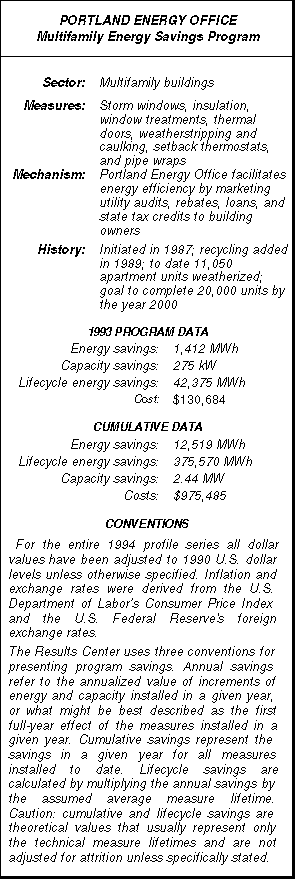Portland Energy Office, Multi-family Energy Savings Program (residential), Profile #104
EXECUTIVE SUMMARY
 The City of Portland, Oregon is a mecca of energy and environmental responsibility. In 1979, Portland became the first U.S. city to forge a comprehensive energy policy. The same year it established the Portland Energy Office. In 1993, Portland became the first U.S. city to adopt a local carbon dioxide reduction strategy, committing to reduce its CO2 emissions by 20% below 1988 baselines by the year 2010, far surpassing the levels specified as a result of the international Climate Convention that developed from the Earth Summit in Rio de Janeiro.
The City of Portland, Oregon is a mecca of energy and environmental responsibility. In 1979, Portland became the first U.S. city to forge a comprehensive energy policy. The same year it established the Portland Energy Office. In 1993, Portland became the first U.S. city to adopt a local carbon dioxide reduction strategy, committing to reduce its CO2 emissions by 20% below 1988 baselines by the year 2010, far surpassing the levels specified as a result of the international Climate Convention that developed from the Earth Summit in Rio de Janeiro.
Portland’s carbon dioxide emission reduction strategy reinforces the City’s civic nature. It embodies broad efficiency gains through improvements in transportation and building efficiency; coupled with the promotion of renewable energy, cogeneration, and recycling; as well as tree planting in and outside of the City; and even lobbying at the Federal level to increase and institutionalize the wise use of energy. Clearly, Portland epitomizes the slogan "thinking globally and acting locally." Though the City does not have a municipal utility, it has worked cooperatively with private electric and gas utilities, and with the Oregon Department of Energy, to facilitate energy efficiency.
One of the most challenging building segments to address in any area is the multifamily sector, largely due to the split incentive between landlords and tenants. Since tenants generally pay the utility bills, landlords have little incentive to improve the efficiency of their buildings. In Portland, this quagmire has been amplified by the great demand for housing, further reducing landlords’ incentives to invest in energy efficiency. Given this dilemma and the fact that nearly 50% of the housing in Portland is made up of rental units, the Portland Energy Office designed and implemented the Multifamily Energy Savings program in 1987.
The Multifamily Energy Savings program serves to encourage retrofits by marketing existing efficiency services -- such as utility audits, rebates, and loans, plus state tax credits -- to building owners. Through its facilitation of diverse incentives, building owners in Portland have been surprisingly receptive to investing in energy efficiency measures such as windows, insulation, common area lighting, water heaters, air sealing, and heating system improvements.
To date more than 11,050 apartment units have been weatherized as a result of the program, with savings of approximately 1,200 kWh annually per unit. Not only has the program been highly successful, but it has been coordinated at very little cost to the the City, at a cost of less than one cent per kilowatt-hour saved. Through its one-stop approach for apartment owners, the Portland Energy Office provides a model of collaboration for servicing a hard-to-reach market sector with a range of resource efficient strategies.
[CLICK HERE TO DOWNLOAD THE ENTIRE 20 PAGE PROFILE IN PDF FILE FORMAT]
This profile was produced by

